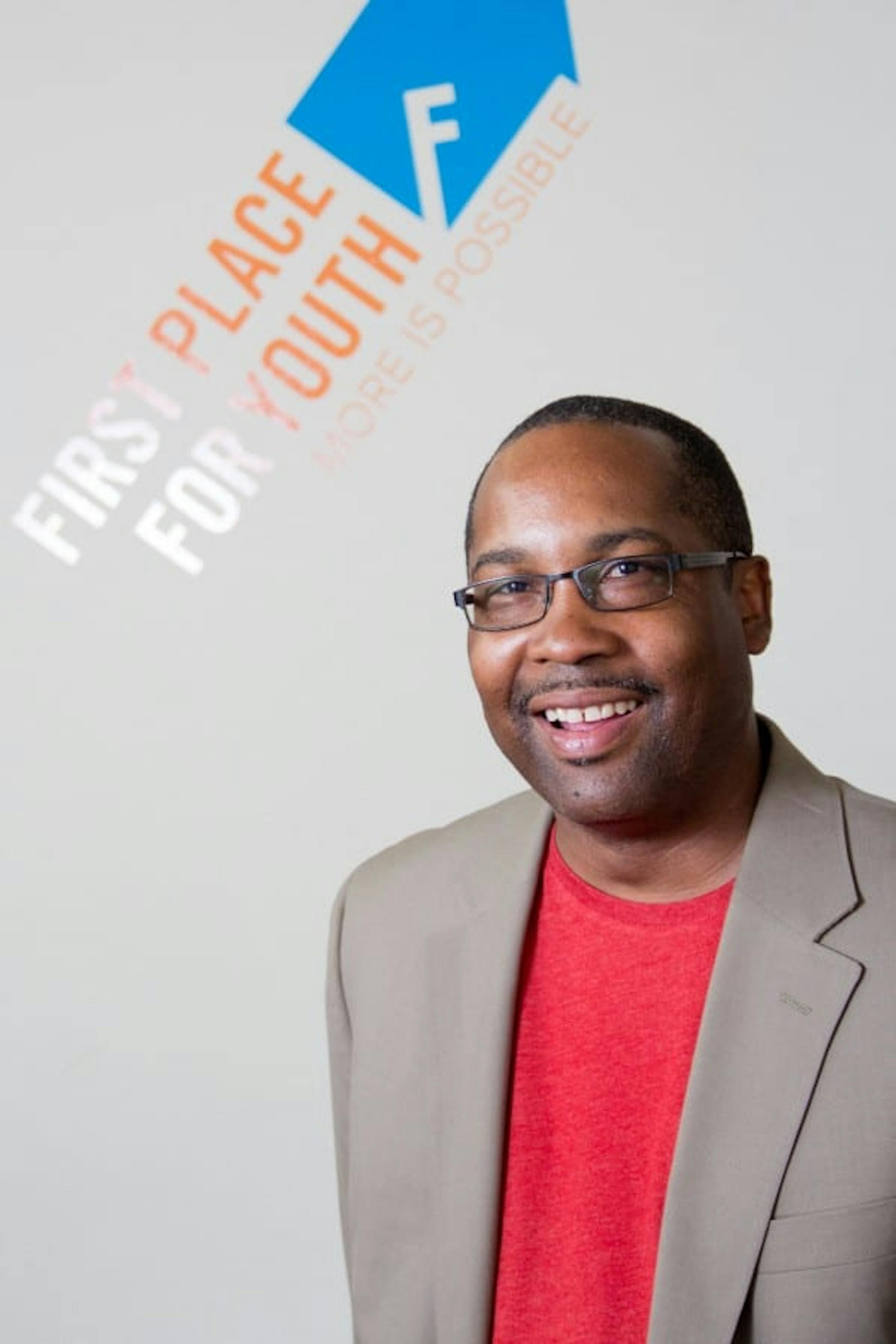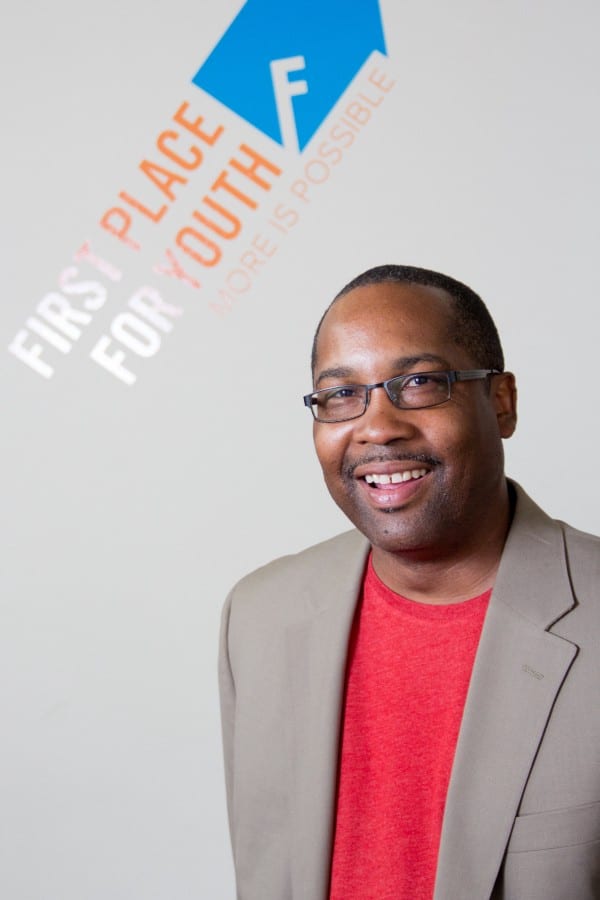Meet Sam Cobbs, CEO of First Place for Youth

First Place for Youth is the preeminent provider of education, employment, healthy living, and housing support for the nearly 5,000 young people exiting foster care in California each year and one of Tipping Point’s original grantees. CEO Sam Cobbs took over at First Place a decade ago, and has grown the organization’s reach from about 40 young people served annually to 1,200 here in the Bay Area alone. Cobbs has garnered the attention of national funders like the Edna McConnell Clark Foundation and has testified before the U.S. House of Representatives in favor of extending foster care to better meet the needs of emancipating youth.
TPC: Why do you do this work?
SC: My path to my work was a personal one, having experienced poverty and homelessness myself. As a child, my family struggled to make ends meet for a period of time. I know what it’s like to go through applying — and being rejected — for public assistance. My background has given me an empathy and understanding for the situations our clients face, and for what it takes, how disciplined you have to be, and what type of support you need to bring yourself out of those situations.
My professional experiences have also led me to where I am today. It started at the West Oakland Boys and Girls Club, where I realized that the messages we were trying to teach young people weren’t sticking. The kids went home, and because their family environments were so often challenging, our lessons were not reinforced. I transitioned to a role at Larkin Street Youth Services, where we offered a full, comprehensive set of services. It was a great place to cut my teeth and I began to narrow my focus on young people in the foster care system and those transitioning out of it. I saw that this specific subset of young people was feeding our homelessness problem, especially in San Francisco. When we opened up the first shelter for 18-to-24-year-olds at Larkin Street, of the 400 young people who moved in, about 370 had experience with the child welfare system. The opportunity to join First Place and tailor services to meet the unique needs of these youth impact felt like the natural next step in my progression.
TPC: How do young people find First Place and what’s the most important service you provide for them?
SC: We’ve found the primary way young people come to us is by word of mouth via both our current and former participants, which we see as an indicator of our credibility. Once they get in touch with us, we’ve found that their number one need is housing. At intake, we assess where each client is in his/her process to understand specific obstacles and build a case plan. Within three weeks with us, our clients typically move into an apartment where we subsidize rent until they get a job. We want to begin to help them understand that they have to pay it forward. We work with them to gain employment and education, and address their social and emotional needs as well. We have found that housing costs make up about 50% of what it costs to serve a young person exiting foster care, and that filling that basic need has to come first. At the same time, it is our comprehensive and intensive suite of services that allows us to take them from surviving, to striving, to thriving on their own.
TPC: You’ve been with First Place for Youth for over 10 years now. How has the work changed in that time?
SC: In the 10 years I’ve been here, our focus and mission to support youth transitioning out of foster care hasn’t changed at all, but how we go about doing the work has shifted significantly. When I look back, I see that the work we do is about poverty. Many of our participants feel they were lucky to be removed from their families and put into foster care, but just because you put someone in a safe situation does not mean that the traumatic experiences they’ve been through disappear.
We’ve known this instinctually for years and are committed to helping our young participants overcome the effects of these experiences. Recently, we’ve taken advantage of the evidence-based research that Dr. Nadine Burke Harris and the Center for Youth & Wellness conducted on the effects of stressful situations on children’s health. We’ve used this research to expand our existing base of trauma knowledge and to inform and shape programs that more meaningfully support our young participants. All this to say, we have a deep, abiding commitment to our clients’ futures, and the understanding of poverty as the root issue they face has been critically important to helping them successfully transition from foster care to self-sufficiency and break the cycle of poverty.
Today, I’m proud that 86% percent of our clients are reliably housed and over two-thirds go to college. Our program graduates are also three times less likely than other former foster youth to be arrested or to become teenage parents. I think about tremendous individuals like Leilani — and I know there are so many stories of success out there just like hers.
TPC: How has your relationship with Tipping Point evolved over the past decade?
SC: I received my first phone call from Tipping Point when I had been CEO of First Place for exactly three days. Daniel said to me, “Hey Sam, we know you’re new on the job, we’re going to be over your way, we’d love to stop in and say hi, and see what you need.” I had no idea what I needed I was so new, but when a funder wants to meet with you, you take the meeting. We ended up asking for $10,000 and Tipping Point not only approved those funds, they also got me executive coaching and came back with additional general operating support. Since then, Tipping Point has become a close advisor to my team and me. We expose ourselves to them, our strengths and our weaknesses and they do everything in their power to link us to the resources we need to be better at serving youth in the Bay Area. Just as First Place has grown and changed, it’s great to see Tipping Point branch out into new areas like R+D. I attended the T Lab Playback event last year and appreciated that the groups focused on the toughest places in the Bay Area — places like East Oakland and Richmond — to test ideas and do research. It feels like both organizations have made progress in clarifying who we are looking to serve and what the needs really are. We feel fortunate to be evolving in this important work, together.
Since 2005, Tipping Point has invested nearly $2.7 million to bolster the efforts and expansion of First Place for Youth. To learn more, visit firstplaceforyouth.org.


